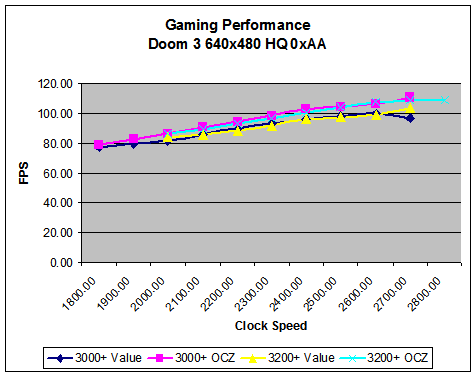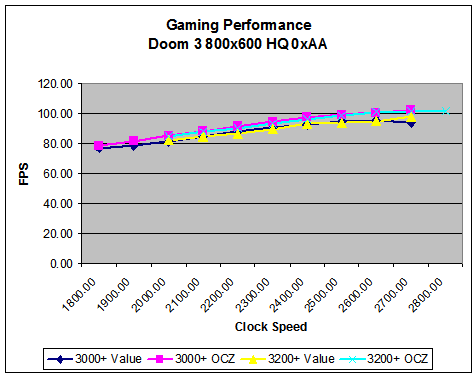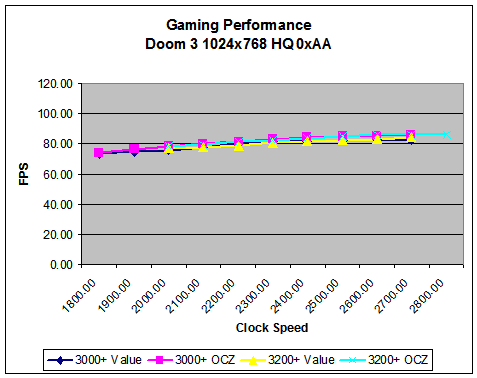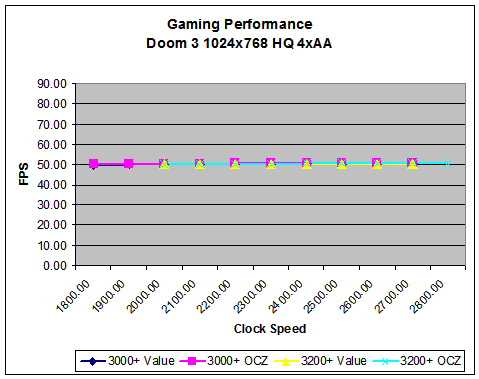Investigations into Socket 939 Athlon 64 Overclocking
by Jarred Walton on October 3, 2005 4:35 PM EST- Posted in
- CPUs
Doom 3 Performance
More so than any other game that we tested, Doom 3 is going to be held up by the X800 Pro. With the engine being heavily optimized for NVIDIA's architecture - or simply being a better fit for OpenGL and shadows, if you prefer - performance scaling drops off rapidly with increasing resolutions. Whether future Doom 3 engine licensees will exhibit similar results is up for debate, Call of Duty and Wolfenstein: Enemy Territory, for example, don't correlate directly with Quake 3 performance. However, we expect NVIDIA to maintain some advantage over ATI in Quake 4 and Quake Wars.
More so than any other game that we tested, Doom 3 is going to be held up by the X800 Pro. With the engine being heavily optimized for NVIDIA's architecture - or simply being a better fit for OpenGL and shadows, if you prefer - performance scaling drops off rapidly with increasing resolutions. Whether future Doom 3 engine licensees will exhibit similar results is up for debate, Call of Duty and Wolfenstein: Enemy Territory, for example, don't correlate directly with Quake 3 performance. However, we expect NVIDIA to maintain some advantage over ATI in Quake 4 and Quake Wars.














101 Comments
View All Comments
Powered by AMD - Monday, October 3, 2005 - link
Do not forget The Athlon XP 1700+ 1.5Volts, DLT3C, mines is OC from 1467 Stock to 2250 Mhz and pretty cool with an old Thermaltake Blower...It can ever reach 2450 Mhz but with 1.8 Volts.
hey, at 2250 Mhz its a 53% OC too!!
Great article but it will be useful for me only when I need an Athlon 64 :p
donkeycrock - Monday, October 3, 2005 - link
i noticed that frys is selling x-connect (500 Watts)psu for 25 dollars after rebate. it is extremely heavy, and not many reviews say if they are very good PSU's for overclocking, anybody have knowladge about this PSU.thanks
brad
cryptonomicon - Monday, October 3, 2005 - link
nice article jarred, and you worded the disclaimers perfectly, bravo.and its nice to see those ram comparisons. good to see those results on the latest a64 platform and confirm once again that the ram makes only a few percentage points difference, if that. shelling out all your dough on a good GPU, then buying the lowest model venice, a DFI board, and value ram is the way to go.
Googer - Monday, October 3, 2005 - link
http://www2.amd.com/us-en/assets/content_type/Down...">AMD Thermal Grease List PDFRupertS - Wednesday, October 26, 2005 - link
Interesting, AMD only recommends thermal grease for short term use 'where the heat sink is removed and attached multiple times over a short period'. They definitely do not recommend it for long term use.StriderGT - Monday, October 3, 2005 - link
Both me, Zebo and many others have clarified long time ago in Anands forum the pointless struggle of purchasing extreme memory parts in Athlon64. Dividers and value ram will do the trick of excellent ocing giving you 95%++ of the performance someone gets with expensive and overvolted ram modules. Nice seeing anandtech come up with an article backing up the threads like this one (http://forums.anandtech.com/messageview.aspx?catid...">http://forums.anandtech.com/messageview...mp;threa...PS For those owning MSI Neo3 m/bs -and even the rest- I have created back then an excel calculating the actual memory frequency with the various BIOS settings. Enjoy
http://www.geocities.com/gtstrider/">http://www.geocities.com/gtstrider/
JarredWalton - Monday, October 3, 2005 - link
Yeah, I've seen quite a few threads around the 'net on this, but AT hadn't covered it very well, and I hoped to get something "official" out there. (None of the enthusiast sites have really covered this that well, as far as I could see.) Since I've been fooling around with various AMD CPU overclocks for a year now, I figured others might like to see the possibilities. High-end, high-cost is well and good for dreams, but like most people I live a bit closer to reality. $200 is about as much as I'm willing to pay for a CPU in most cases.andyc - Monday, October 3, 2005 - link
So you can basically overclock the 3000 to the same speeds the 3200 can? So it's not even worth it to go with the 3200?JarredWalton - Monday, October 3, 2005 - link
Well, perhaps. 9x300 requires a better motherboard than 10x270, though most boards than can handle 270 MHz CPU bus speeds will also handle 300 I think. For value overclockers, though, I don't think I'd bother spending the extra $50 on the 3200+, no. Spend it on the GPU instead (if you play games).Mogadon - Monday, October 3, 2005 - link
Great article Jarred, thanks for putting in all the hard work and time.I have one question regarding voltages. As I understand it, you wouldn't recommend running a VCore above 1.65V for a long term overclock. I understand the warnings and possible effects on the CPU with running a high VCore but I wanted to know if this is around the VCore that you would run on, say, your overclocked system?
The majority of people on the forums here don't really recommend going above 1.55V or 1.6V, i was wondering if you had any comments about this.